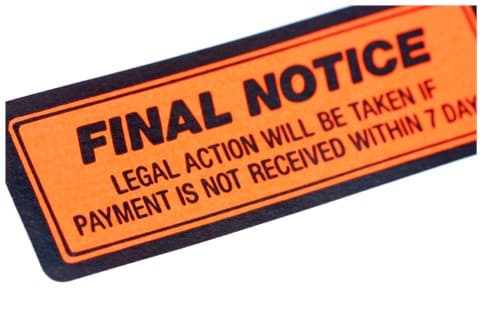CFPB: Supervising Debt Collectors
- According to the CFPB about 30 million Americans have debt under collection.
- The CFPB is stepping in to supervise the debt collection industry.
- Learn about the debt collection process to guard yourself against bad debt collection practices.
- Start your FREE debt assessment
CPBP to Begin Supervising Debt Collectors
American consumers have more than $800 in credit card debt, close to $1 trillion in student loans and mortgage foreclosure at record levels. Many Americans are not able to make their payments on time.
When a borrower defaults on their loan or debt, then debt collectors step in and put on the pressure. Many times, the debt collectors harass and use illegal debt collection tactics, in order to scare the consumer into paying debts.
Richard Cordray, the head of the CFPB (Consumer Financial Protection Bureau) announced on February 15 2012 that the Bureau would step up its efforts to supervise debt collectors and credit agencies. According to the CFPB press release issued on February 16, 2012 about 30 million Americans have debt under collection. The average amount of debt under collection for these consumers is $1,400.
The FTC and Regulating Debt Collection
Debt Collection is regulated through federal and state laws, and the Federal Debt Consumer Protection Act (FDCPA). These laws and rules are not always easily accessible to consumers. Unethical debt collectors often take advantage of debtors.
The FTC (Federal Trade Commission) is the major regulator. It provides both consumer information and an address for complaints. They have a Web page dedicated to helping the consumer identify and deal with a fake debt collector. Here are some tips offered by the FTC: "A caller may be a fake debt collector if he:
- Seeks payment on a debt for a loan you do not recognize;
- Refuses to give you a mailing address or phone number;
- Asks you for personal financial or sensitive information (such as your Social Security number); or
- Exerts high pressure to try to scare you into paying, such as threatening to have you arrested or to report you to a law enforcement agency."
The FTC provides much more information and guidance as relates to debt collectors, as well as an avenue to make a complaint.
The CFPB & Supervising Debt Collectors
Richard Cordray is quoted by the LA Times as saying that, "Debt collectors and credit reporting agencies have gone unsupervised by the federal government for too long". He continued to point out that "Consumers don't get to choose their debt collector, and they don't get to choose whether to have the consumer credit reporting agencies keep track of their credit history".
Debt Collectors — Large Participants
The CFPB is in the midst of defining which agencies fit into the category of large participants that should be included in their non-bank supervision. The CFPB's proposal would include debt collectors that have over $10 million in annual receipts. According to the CFPB's survey, this would include about 175 debt collection firms. Those 175 debt collection agencies represent about 4% of the firms in the industry, but 63% of annual receipts.
Types of Debt Collectors
There are different types of debt collection firms. The CFPB has identified and classified the debt collectors into three main categories as follows:
- Companies that collect debt owned by another company in return for a fee.
- Companies that buy debt from another company and pursue the borrowers for themselves.
- Law firms and debt collection attorneys.
The CFPB plans to supervise large debt collectors in all three categories.
Quick Tip
Use the Debt Coach to help you find the right solution.
Learn About Debt Collection
While it is nice to have regulators like the FTC and enforcers like the CFPB, getting debt free is up to you. The cycle of debt is a trap, where you keep paying more interest and financial cost, just to cover your existing debt payments.
Although each situation is unique, and many times requires professional legal advice, Bills.com provides you with valuable information to help you make informed financial decisions.

Are you overwhelmed by debt? Debt problems cause a lot of stress. Even if you are keeping a budget, higher expenses and/or lower income can cause you to get deeper in debt.
Once you fall behind in your payments, the lender will begin to take collection action against you. Sometime the original lender acts on its own, and sometimes it will sell the debt to a collection agency. (They have different rules and regulations). In many cases, a long time passes without anything happening and suddenly you are bombarded with collection calls, letters, and many time threats. Even small debts can cause embarrassment. Scammers try to collect on debts you don't even owe, and unscrupulous debt collectors misinform you about debts that have expired. Oftentimes debts are paid off, just to avoid the hassle.
Debt, and debt collection involves many technical and legal terms, often unclear and confusing. Terms like, debt validation, charge-offs, summons, judgments, wage garnishments, bank levies and liens can be difficult to digest. Collection laws and statute of limitations (SOLs) are key factor in deciding how to deal with debt, but are hard to understand.
Steps to Take
To improve your debt situation here are some preliminary steps to take:
- Familiarize yourself with collection terms by reading the Bills.com article about collection advice.
- Read and learn about statutes of limitations and if they apply to you.
- Read and learn about collection laws and exemptions.
Most importantly, take the right steps to reach a debt relief solution. There are various debt relief solutions, including debt consolidation, credit card counseling, debt settlement, or bankruptcy. By learning about the debt collection process, including debt collectors practices, you will be able to find a debt relief solution most appropriate to your situation.
Free up cash each month with Freedom Debt Relief

Ozzy S., Freedom client
“Right away, I had more money each month because of program costs so much less than what I was paying on my minimums.”
Actual client of Freedom Debt Relief. Client’s endorsement is a paid testimonial. Individual results are not typical and will vary.

